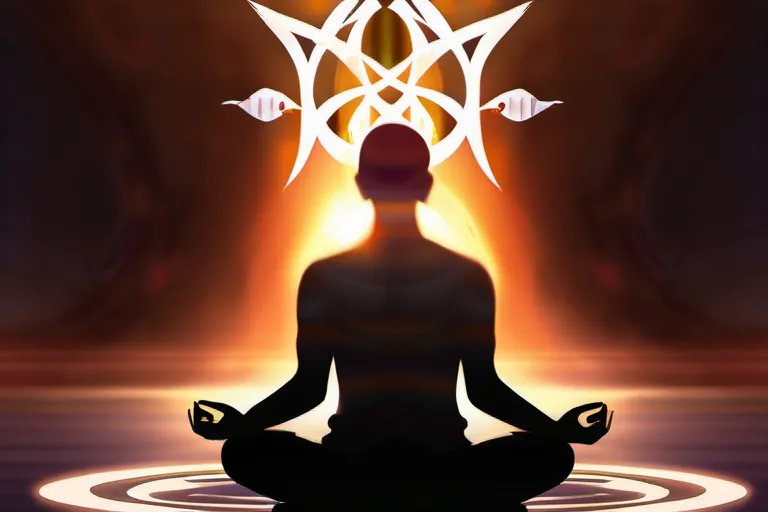Exploring the nuances between religious beliefs and spiritual practices
In today’s diverse world, it is essential to understand the differences between religion and spirituality. While they share some similarities, they are distinct concepts that often intertwine in people’s lives. This article will delve into their unique aspects, helping you gain a deeper understanding of both.
The Origins: Religion and Spirituality
Imagine religion as a vast, ancient library filled with countless volumes of texts and doctrines, each telling stories about the divine and how to live in harmony with it. Now think of spirituality like a personal journey through those halls, picking up wisdom from different books, but often following your own path.
How did these two concepts come into being? Where did religion begin? It traces back to ancient civilizations where people sought explanations for natural phenomena and ways to appease the gods. From the Egyptian pantheon of deities to the Vedic hymns of India, religious practices evolved as societies grew more complex.
But what about spirituality? It’s a bit like wandering through a forest, finding your own way under the canopy of trees, rather than following someone else’s path. Spirituality often emerges from individual experiences and personal revelations, focusing on inner peace and self-discovery.
The origins of religion can be seen in ancient rituals and sacrifices, where people tried to influence the whims of gods through offerings and prayers. On the other hand, spirituality might have its roots in early meditation practices or solitary contemplations that led individuals to seek deeper meaning beyond material existence.
Both concepts share a common thread: they provide frameworks for understanding our place in the world and navigating life’s challenges. But while religion often provides organized structures with specific dogmas and rituals, spirituality can be more fluid, allowing for personal interpretation and growth.
Defining the Terms: What is Religion? What is Spirituality?
So, where do we start when defining religion and spirituality? It’s like trying to pin down the wind—ever-changing yet deeply influential in human history and daily life. Religion, for many, is about organized beliefs and practices that form a structured system of thought centered around supernatural beings or deities. Think of it as a vast library with well-defined sections and rules—books on gods, rituals, and ethics. But what about the quieter, more personal journey? That’s where spirituality steps in.
Spirituality is like wandering through a dense forest without a map; you explore your inner world, seeking meaning and connection beyond the tangible. It’s less about following strict doctrines and more about experiencing a profound sense of self and existence. Here, one might find solace in meditation, nature, or personal reflection—paths that lead to enlightenment but not necessarily through organized channels.
When we delve into these concepts, it’s essential to recognize the key characteristics that set them apart. Religion often has a defined hierarchy and a set of rituals that are communal and publicly practiced. It provides a framework for behavior and morality, giving its followers a sense of belonging within a larger community. Meanwhile, spirituality is more about personal growth and inner peace; it’s the quiet voice in your head guiding you through life’s challenges.
So, how do we navigate this complex landscape? Are these just abstract ideas, or do they shape our daily lives profoundly? By understanding the differences between religion and spirituality, we might uncover deeper insights into what makes us tick—both individually and as a society. The journey to defining them isn’t easy, but it’s certainly worth exploring if you want to find your own path through life’s many questions.
The Role of Institutions: Organized Religion vs. Personal Spirituality
Have you ever wondered how organized religion differs from personal spirituality? It’s like comparing two vast oceans, both teeming with life yet distinct in their depth and breadth. Organized religion often relies on institutional structures that provide a framework for belief and practice. Churches, mosques, synagogues—these are the physical and social spaces where believers gather to worship, learn, and seek community. But what about those who find solace in personal spirituality? Can’t we all just have our own spiritual journeys without needing an institution?
Consider institutional religion like a well-structured library. There are clearly defined books (scriptures), librarians (clergy) to guide you, and organized sections (denominations) for various types of knowledge. This structure makes it easier for people to navigate the vast sea of beliefs. However, it can also feel constraining for those who seek a more flexible approach.
In contrast, personal spirituality is like wandering through a dense forest, where the paths are not marked and the trees are just waiting to be climbed or embraced. It’s about discovering your own beliefs, practices, and connections with the divine in a deeply personal way. This can bring a sense of freedom but might also leave one feeling lost in the vastness.
Both approaches have their roles in our lives, offering different levels of guidance and support. The question is, which path do you choose? Do you prefer the safety and structure of institutional religion or the wild adventure of personal spirituality? Or perhaps a blend of both—finding the balance between community and individuality.
Ultimately, whether one follows organized religion or practices personal spirituality, what matters most is the journey. It’s about understanding where you come from, who you are, and where you’re going. Whether it’s through the structured guidance of a faith tradition or the open-ended exploration of your own inner world, both can lead to profound growth and fulfillment.
Beliefs and Practices: Comparing the Two
Have you ever wondered how people can follow the same book or attend the same place of worship but still have such different experiences? It’s like two people walking down the same path, yet one sees a forest and another perceives an ocean. This difference often comes from the distinction between religion and spirituality.
Religion, in many ways, is like a map to a destination. It provides a framework of beliefs, rituals, and practices that guide individuals through life’s journey. Think of it as following a well-trodden path with clear markers and rules. Churches, mosques, synagogues, and temples serve as physical manifestations where believers gather to worship, learn, and find community. These institutions often prescribe specific behaviors, beliefs, and even dietary laws, creating a structured experience that many people find comforting and familiar.
On the other hand, spirituality is more like wandering through an uncharted landscape. It’s about exploring one’s own inner world, seeking personal connection with something greater than oneself, often without the formal trappings of organized religion. This can be as simple as meditation in a quiet park or as profound as attending a silent retreat. Spirituality emphasizes individual experience and expression, allowing for a wide range of practices such as yoga, nature walks, or even creative arts to find peace and meaning.
The key difference lies in the emphasis: religion tends to focus on adherence to established doctrines, while spirituality is more about personal growth and self-discovery. Both can offer profound insights into human existence, but they approach these questions from different angles—religion often through a set of teachings, and spirituality through direct experience.
So, when you hear someone say they are spiritual but not religious, imagine them taking the scenic route while others stick to the main roads. Both paths lead somewhere, but they offer vastly different journeys. Understanding this difference can help us appreciate the diverse ways people seek meaning in their lives and respect each other’s choices.
The Intersection: How Religion and Spirituality Overlap
How often do we find ourselves pondering over the lines that separate religion from spirituality? Are they as distinct and separate as we might think, or do they intertwine in ways that are both subtle and profound?
Consider religion as a well-structured garden, meticulously planned with its paths, flowers, and boundaries. Each path leads to a specific destination, and each flower represents a ritual or practice. Now, think of spirituality as a vast forest, sprawling and uncharted, where the paths are less defined, and the trees symbolize personal beliefs and inner journeys.
At times, these two realms overlap in beautiful ways, creating a rich tapestry of human experience. For instance, many religions have practices that encourage meditation or contemplation, which are also core aspects of spirituality. These overlapping elements can be seen as bridges, connecting the structured paths of religion to the open landscapes of spirituality.
Take the act of praying, for example. Is it a religious ritual seeking divine guidance in a specific community or a personal spiritual practice aimed at finding inner peace and connection? The line between these two can be incredibly fine, making one wonder how deeply intertwined they truly are.
Moreover, consider the role of sacred texts. In many religions, these books offer not just doctrines but also profound philosophical insights that resonate on a spiritual level. These texts serve as maps for both religious practitioners and those seeking deeper spiritual understanding.
As we explore this intersection, it becomes clear that religion and spirituality are not in opposition but rather complementary forces. One might argue that true spiritual growth often requires the structure and guidance provided by religious beliefs, while religion can be enriched by the personal and introspective practices of spirituality.
So, how do you navigate these overlapping territories? Do you find yourself drawn more to the structured paths of religion or the open spaces of spirituality? Or perhaps both coexist in a harmonious balance within your life?
The Importance of Understanding the Differences
Understanding the differences between religion and spirituality is crucial, especially in today’s interconnected world. How many times have you heard someone say, ‘Religion isn’t for me, but I still find solace in spirituality’? These two concepts often coexist, yet they are distinct paths towards understanding one’s place in the universe.
Imagine religion as a well-structured building with clear blueprints and designated roles. Each member knows their place and follows specific practices and beliefs to adhere to the structure. On the other hand, spirituality can be likened to a garden where anything can grow—no strict rules or defined paths. Here, individuals cultivate personal connections with something greater than themselves, often through meditation, nature, or introspection.
Why does this distinction matter? Consider the impact on one’s identity and community engagement. For some, following a specific religion provides comfort in belonging to a group that shares similar beliefs and practices. However, others might find more personal fulfillment in exploring their spirituality without strict adherence to religious doctrines. Both paths can enrich lives, but they offer different experiences and support systems.
Moreover, recognizing these differences helps in fostering a more inclusive society. By understanding that not everyone follows the same path or adheres to the same beliefs, we can create environments where diverse individuals feel accepted and valued. It encourages open dialogue and mutual respect, breaking down barriers between those who see the world through religious lenses and those who seek spiritual growth independently.
As we navigate our complex world, embracing this distinction allows us to appreciate the diversity of human experience. Whether someone finds their peace within a structured religion or in the quiet solitude of their own thoughts, both journeys are valid and enriching. The key lies in respecting these differences while acknowledging that they can coexist harmoniously.
Conclusion
 By the end of this article, you will have a clearer picture of religion and spirituality, enabling you to appreciate their individual roles in shaping human beliefs and practices.
By the end of this article, you will have a clearer picture of religion and spirituality, enabling you to appreciate their individual roles in shaping human beliefs and practices.











